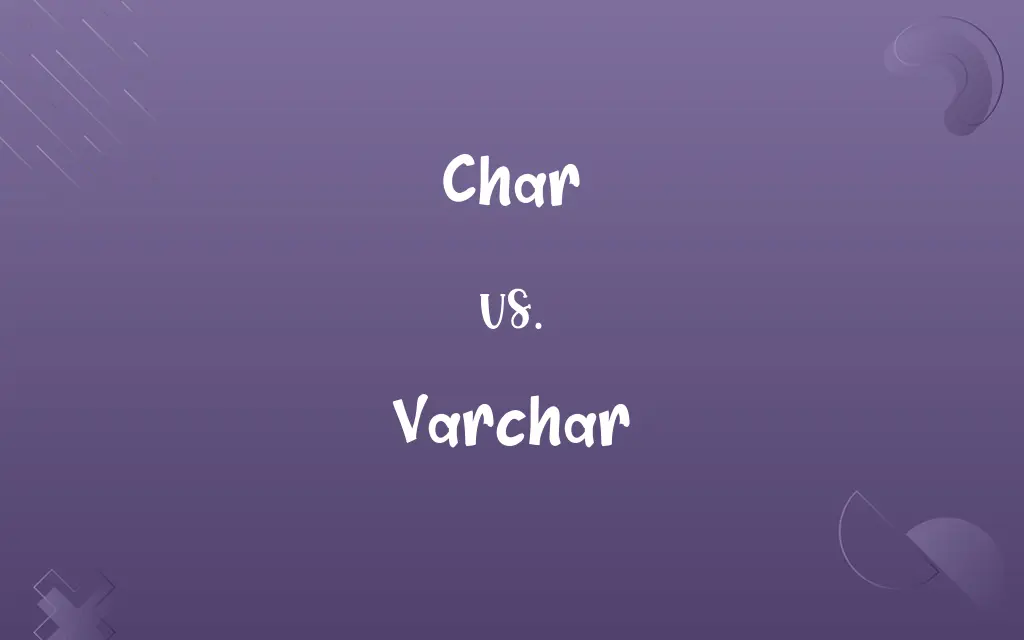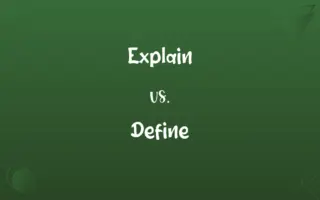Char vs. Varchar: Know the Difference

By Dua Fatima & Shumaila Saeed || Published on June 23, 2024
Char stores fixed-length strings; efficient for known sizes. Varchar stores variable-length strings, saving space for shorter inputs.

Key Differences
Char is designed for storing strings with a fixed length, making it suitable for data that varies little in size, such as abbreviations or codes. Varchar, on the other hand, is used for strings of variable length, offering flexibility and space efficiency for texts of varying sizes.
Dua Fatima
Jun 23, 2024
In terms of storage, Char occupies a predefined amount of space regardless of the actual string length, potentially leading to wasted storage space for shorter strings. Varchar only uses as much space as needed for the stored string plus an additional overhead for storing the length of the string.
Shumaila Saeed
Jun 23, 2024
Char fields are faster to search through because the fixed size makes it easier for the database engine to locate records. Varchar fields may introduce slight overhead due to their variable length, impacting retrieval speed for large datasets.
Dua Fatima
Jun 23, 2024
Char is often recommended for storing fixed-size data where the length of the string is consistently the same, as it ensures performance efficiency. Varchar is preferred for text fields that can vary significantly in length, such as descriptions or comments.
Dua Fatima
Jun 23, 2024
The choice between Char and Varchar affects database performance and storage. Using Char for variable-length text can lead to unnecessary storage consumption, while using Varchar for fixed-length data can incur unnecessary overhead for managing string lengths.
Shumaila Saeed
Jun 23, 2024
ADVERTISEMENT
Comparison Chart
Storage Efficiency
Less efficient for variable-length strings
More efficient for variable-length strings
Shumaila Saeed
Jun 23, 2024
ADVERTISEMENT
Char and Varchar Definitions
Char
Less flexible compared to Varchar.
Char(10) will always use ten characters of storage, even for a single letter.
Shumaila Saeed
Feb 27, 2024
Varchar
Saves storage space for shorter strings.
Storing Hi in Varchar(5) uses only two characters of space.
Dua Fatima
Feb 27, 2024
Char
Requires padding for shorter strings.
Storing Hi in Char(5) pads it with spaces to fill the length: Hi .
Dua Fatima
Feb 27, 2024
Varchar
Flexible for varying text sizes.
Email field can use Varchar(255) to accommodate different email lengths.
Shumaila Saeed
Feb 27, 2024
Char
Predictable storage size for database optimization.
A database column for Gender might use Char(1) to store M or F.
Shumaila Saeed
Feb 27, 2024
ADVERTISEMENT
Varchar
Can be less efficient for fixed-size data.
Using Varchar for State Code with always 2 characters wastes space.
Shumaila Saeed
Feb 27, 2024
Char
Efficient for storing data with a uniform size.
US States could use Char(2) for state codes like NY, CA.
Shumaila Saeed
Feb 27, 2024
Varchar
A data type for variable-length strings.
Comments field in a database can use Varchar(255) for user feedback.
Dua Fatima
Feb 27, 2024
Char
A data type for fixed-length strings.
UserType in a database might use Char(5) to store roles like Admin or User.
Dua Fatima
Feb 27, 2024
Varchar
Includes length overhead.
Varchar(100) stores the string length, using extra bytes.
Hifza Nasir
Feb 27, 2024
Varchar
A text field of indeterminate length in a database, as opposed to the traditional fixed-length field.
Dua Fatima
Jan 22, 2024
Repeatedly Asked Queries
What is Varchar used for?
Varchar is used for storing variable-length character strings, such as names, descriptions, or any text whose length can vary.
Dua Fatima
Jun 23, 2024
What is Char used for?
Char is used for storing fixed-length character strings, such as codes or identifiers, where the length does not vary.
Shumaila Saeed
Jun 23, 2024
Is Char or Varchar faster?
Char is generally faster for retrieval due to its fixed length, which simplifies indexing and searching.
Dua Fatima
Jun 23, 2024
Can I change a Char field to Varchar?
Yes, but it may involve altering the table schema, which could affect data storage and performance.
Dua Fatima
Jun 23, 2024
What happens if I store a string longer than the defined Char length?
The string will be truncated to fit the Char field's defined length.
Shumaila Saeed
Jun 23, 2024
Does Varchar save space compared to Char?
Yes, Varchar saves space for strings shorter than the maximum specified length by only using the necessary amount of storage.
Dua Fatima
Jun 23, 2024
How does Varchar handle very long strings?
Varchar can store strings up to its maximum defined length, efficiently using storage space for the actual length of the string.
Dua Fatima
Jun 23, 2024
Can I use Char for variable-length strings?
You can, but it's not recommended due to space inefficiency for strings shorter than the fixed length.
Shumaila Saeed
Jun 23, 2024
Is there a difference in how Char and Varchar are used across different databases?
The basic concepts are consistent, but implementation details and performance can vary across different database systems.
Dua Fatima
Jun 23, 2024
How does Char handle strings shorter than its defined length?
Char pads shorter strings with spaces to match the defined length.
Shumaila Saeed
Jun 23, 2024
How does storage efficiency compare between Char and Varchar?
Varchar is more storage-efficient for variable-length data, while Char can waste space for shorter strings.
Shumaila Saeed
Jun 23, 2024
How do I decide between using Char and Varchar?
Consider the nature of the data: use Char for fixed-size data and Varchar for variable-size data to optimize storage and performance.
Shumaila Saeed
Jun 23, 2024
Are there any length limitations for Char or Varchar?
Yes, both have maximum length limitations, which vary by database system.
Dua Fatima
Jun 23, 2024
How does the overhead of Varchar affect database performance?
The overhead for storing the length of each string can slightly affect performance, especially with very large datasets.
Hifza Nasir
Jun 23, 2024
Why might someone choose Char over Varchar?
For consistently sized data, Char can offer performance benefits due to its fixed length.
Shumaila Saeed
Jun 23, 2024
Share this page
Link for your blog / website
HTML
Link to share via messenger
About Author
Written by
Dua FatimaCo-written by
Shumaila SaeedShumaila Saeed, an expert content creator with 6 years of experience, specializes in distilling complex topics into easily digestible comparisons, shining a light on the nuances that both inform and educate readers with clarity and accuracy.








































































